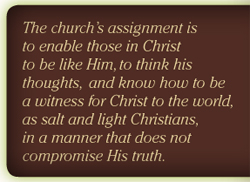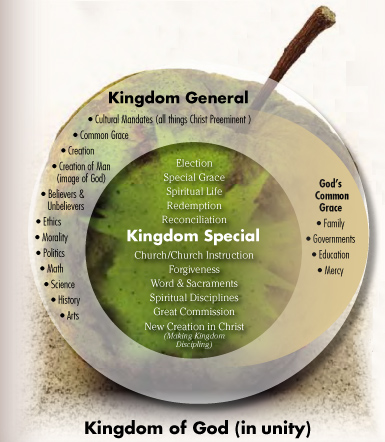
I have had people ask why it is so important to think from a kingdom world and life view perspective. Why is it important to have a right kingdom paradigm? Jesus said, “Seek first my kingdom…” The kingdom is our priority, if we listen to, seek to please, and serve Him. Of course, that requires knowing something about the kingdom in both its diversity of activities and roles, as well as its unity of purpose. Keep in mind, we are not speaking of the kingdom of God or kingdom of Christ in geographic terms, but rather of the rule and reign of the Lord Jesus as King over His kingdom. Things will change with His final return.
First, I would say that having the right kingdom perspective keeps our focus on the sovereign Lord and King. Life is really about Him and his will in the ultimate sense. We are here at His pleasure, and if we are in His favor, it is by His grace and mercy.
Second, a right view of the kingdom helps remind us that as Christians our lives are whole, not fragmented or chaotic. It avoids the mistake of saying one part of life belongs to the Lord and another part belongs to us, as though there is a part of life and reality that does not belong to the Lord. Life cannot operate with such a dualistic nor even antithetical view between the spiritual and the natural. There is no sacred and secular dualistic approach to life from a biblically reformed position.
Read entire issue of Equip to Disciple, 4th Quarter 2011 (Acrobat Reader required).
Third, being kingdom focused in the wholistic sense, enables us to see that the special and general kingdom are actually one. As one kingdom, it includes the kingdom of darkness (with a little “k”), which should help us remember the church’s mission, as delineated by Jesus in places such as the Great Commission, is the spiritual mission of making kingdom disciples that requires discipling in a way that helps Christians know how to be in the world but not of the world. That is critical.
In Making Kingdom Disciples, A New Framework, we pointed out something we have learned, especially from Ecclesiastes. You can be a Christian and think like a Christian, or you can be a Christian and not think like a Christian, or you can be a Christian and sometimes think like a Christian and sometimes not. The church’s assignment is to enable those in Christ to be like Him, to think His thoughts, as both David and Paul have reminded us (Ps. 139:17, Rom. 12:1 & 2), and know how to be a witness for Christ to the world, as salt and light Christians, in a manner that does not compromise His truth.
 Kingdom discipleship focuses on the transformation of the mind, not simply in an abstract way, but in a manner that enables Christians to know what God would have them to do in life, as they move outside the special kingdom (the church) into the kingdom general to live with a Christian perspective (see illustration on page 8). The key is to have a kingdom focus that understands and knows what it means to acknowledge King Jesus as Lord of all. Of course, you do not have to be a Christian to live in the kingdom general because it encompasses all of life and reality, but to be a Christian living in the kingdom, you must have a Christian perspective and commitment as you live each day. No matter whether you are a school teacher, a technician, a historian, a scientist, an artist, a politician, etc., God requires that we bring His will and the mind of Christ into all those areas of life. If the church is following His instructions regarding the discipleship of all Christians, young and old, we will be better equipped to live in this world in a way that brings honor and glory to our God and does so in a way that demonstrates a Christian influence in all things. Paul said, “Whether we eat or drink or whatever we do, we are to do all to the glory of God” (I Corinthians 10:31).
Kingdom discipleship focuses on the transformation of the mind, not simply in an abstract way, but in a manner that enables Christians to know what God would have them to do in life, as they move outside the special kingdom (the church) into the kingdom general to live with a Christian perspective (see illustration on page 8). The key is to have a kingdom focus that understands and knows what it means to acknowledge King Jesus as Lord of all. Of course, you do not have to be a Christian to live in the kingdom general because it encompasses all of life and reality, but to be a Christian living in the kingdom, you must have a Christian perspective and commitment as you live each day. No matter whether you are a school teacher, a technician, a historian, a scientist, an artist, a politician, etc., God requires that we bring His will and the mind of Christ into all those areas of life. If the church is following His instructions regarding the discipleship of all Christians, young and old, we will be better equipped to live in this world in a way that brings honor and glory to our God and does so in a way that demonstrates a Christian influence in all things. Paul said, “Whether we eat or drink or whatever we do, we are to do all to the glory of God” (I Corinthians 10:31).
As Abraham Kuyper demonstrated in his Lectures on Calvinism, and as does Robert Munger in his popular allegorical booklet My Heart, Christ’s Home, all of life belongs to Him. There is not one square inch that does not belong to Christ, as Kuyper said.
At this point I want to plant this “seed” and continue to water it as we move forward. One of the main concerns preachers and teachers should have, whether formally or informally, teaching the Word to children, youth, and adults, is this: “Are my students or members getting the truth and understanding that being a Christian involves more than the basic and essential personal relation with Jesus? Do they understand that Christianity is a way of life, not only at church or even at home, but in the world as well?”
You may have read or at least heard at some point about a book by Reinhold Niebuhr entitled Christ and Culture. He presents differing thoughts and views on how Christians should relate to their cultural setting. In that book Neibuhr lays out three possible models as they relate to the Christian and culture. The first is called the separational model which refers to Christians withdrawing from the world. The second is the identificational model which refers to Christians living in the world and often identifying, even compromising, with culture. The third is the transformational model which suggests that Christians are responsible to try to transform culture, its structures, laws, etc., seeking to end up with a Christian culture. You recognize that third model in some of the more recent movements such as “reconstruction theonomy” or “the moral majority” or “the new religious right movement.”
All three models revolve around how to be a Christian, in Christ, and how to live in the world in a way that does not compromise the Christian faith nor keep Christians from failing to serve God’s purpose in their lives. As the late Robert Webber once wrote, the issue is, “How can I be a Christian in this dog-eat-dog world?”
We respond to those three paradigms like this (by the way, there is some truth in each of the three though they are ultimately flawed in light of God’s Word):
First, the separation model reminds us that we are not to be of the world, in the sense that our morals, values, lifestyles, and ideologies are not to be determined by the world’s philosophies. However, the Bible does teach that we are to go into the world, yet doing so in a way that enables us to have a holy influence, by not withdrawing our Christian witness.
 Second, the identification model opens the door to be both in the world and of the world which usually translates that the world has more influence on us than we have on the world. Again, we can and should use much in our culture as a means of serving God and bearing witness to Christ, but not to the point of comprising any part of God’s truth. We live in a fallen world and our culture is not free from the kingdom of darkness influence. Actually, we live in daily spiritual warfare. A further point to remember about this second model is that the more we are like something, especially what we are speaking against, the less influence we will have in that circumstance to make a difference.
Second, the identification model opens the door to be both in the world and of the world which usually translates that the world has more influence on us than we have on the world. Again, we can and should use much in our culture as a means of serving God and bearing witness to Christ, but not to the point of comprising any part of God’s truth. We live in a fallen world and our culture is not free from the kingdom of darkness influence. Actually, we live in daily spiritual warfare. A further point to remember about this second model is that the more we are like something, especially what we are speaking against, the less influence we will have in that circumstance to make a difference.
Third, the transformation model indicates that Christians have the responsibility to build a Christian society which is done not only by word and deed but by legislation as well.
As we understand the Kingdom of God or Kingdom of Christ paradigm, we realize that while the kingdom is very present with us, there is also along with that now aspect, the not yet eschatological fulfillment that will happen only with the return of Christ. At that time everything will be transformed into the new heavens and new earth, but not until then will we see complete transformation.
If the above remarks are true, then what is the church’s collective and the Christian’s individual roles in the kingdom? In one sense, as many have said, the church is presently the most visible form of the kingdom; however, we must remember that while the church is that special part of God’s kingdom (see the diagram from the first article in Equip to Disciple, particularly in their roles of making disciples), it must do so in a way that enables Christians to live in the world, unspotted from the world, as “salt and light” Christians. And, we must realize, and not expect, the church, to move beyond its assignment into the general kingdom. For example, while the church must “teach us to observe all things that Christ has commanded,” including how to think from a Christian perspective regarding government or the state, the church does not make political statements that take it outside the kingdom’s special realm and task. Would that the kingdom general were more like the church but not the church like the kingdom general, in all the aspects of life and reality, at least not until Christ returns. However, I think we could say that if the church is faithful in carrying out its disciple-making role, there certainly should be a noticeable Christ-likeness in all areas of life from Christians.
We need to realize that while this approach will not end in cultural transformation, and God does not require that of us, it will enable Christians to be in the world but not of the world and to have, by God’s common grace, a godly influence on those around them without communicating a “holier than thou” attitude. That attitude may in fact give us an opportunity to speak prophetically to that situation or circumstance.
For example, in a certain high school mathematics class there appears to be cheating on tests and homework. It seems as though almost everyone is doing it. The Christian young person understands that he must live the truth, do his work, and trust the Lord for the results, even when his friends make it easy for him to follow their pattern. You see, that test or homework assignments are not about the student, they are about God whom the Christian represents in that class and what He expects from His students.
Or take the business man compiling his yearly taxes. He knows from some of his associates how to end run the system and violate some of the tax laws, but because his primary mission in his business is to serve Christ and seek to honor Him, he will not allow himself to follow their example.
Or think of all the wife or husband swapping going on in today’s world. Everybody does it and who cares, so what’s the big deal? Christians must care because God has clearly spoken His mind and will regarding sexual behavior and marriage. We do not participate in those activities that violate God’s revealed will. Why? To make us acceptable to God? No, because God, having already chosen us in Christ, desires that our motive be to please Him by living a godly and holy life.
 Developing this world and life kingdom focus means that sermons and Bible studies must be presented in such a way that helps the people to be able to make that kind of world and life view connection. We must know that people in the pew and in our classes struggle to make that connection. They often need help in doing that. So, rather than saying or being tempted to think, “The only way I can survive in this life is to compromise the Christian faith in the marketplace,” we stand strongly and firmly in the Lord and say, “Because of Christ, I cannot compromise His truth even if I am the only one not participating.” That’s where the church’s role to equip Christians to think like a Christian and to live like one, no compromise, but rather to live in a way where all for Jesus comes into play.
Developing this world and life kingdom focus means that sermons and Bible studies must be presented in such a way that helps the people to be able to make that kind of world and life view connection. We must know that people in the pew and in our classes struggle to make that connection. They often need help in doing that. So, rather than saying or being tempted to think, “The only way I can survive in this life is to compromise the Christian faith in the marketplace,” we stand strongly and firmly in the Lord and say, “Because of Christ, I cannot compromise His truth even if I am the only one not participating.” That’s where the church’s role to equip Christians to think like a Christian and to live like one, no compromise, but rather to live in a way where all for Jesus comes into play.
While it is true that Christians live in or may come from different cultures, one being family, another church, another the marketplace, in public and in private, the kingdom disciple, equipped and trained by his church and his own personal studies and devotions, realizes that his life is all about King Jesus. Even as he is trapped in the tension and temptation to be like the world, he realizes giving in to temptation is not God’s will for his life. And remember, as the Apostle Paul said in Romans 12: 1, 2, as we think with a transformed mind, transformed by the Word and Spirit, we will know what God would have us to do.
That, my friends, is what kingdom education or discipleship is all about. Equipping Christians to live for Jesus in a way that serves His purpose through us to this generation. And the earlier we understand that in our Christian lives, the greater our desire will be to serve and please him and consequently experience His power within us. As He said to Pilate on the night of the trial, “I have come to bear witness to the truth.” Those words from Jesus, at that crucial moment in His life, have a message for us. From cradle to grave we are to be people of the truth. That’s what the church is all about-the truth. Paul calls the church the ground and pillar of truth. God’s truth in all of life, helps us through encouragement, instruction, and fellowship as we seek to live for him each day.

We must work and pray for the church to maintain its spiritual role of making kingdom disciples in order for those disciples to live as a Christian in today’s world. One depends on the other even as both the kingdom general and the kingdom special work to serve the same end or purpose which is “seeking to bring honor and glory to God in all things.”
(In part three we will attempt to describe and design the church’s role in discipling God’s covenant people.).
